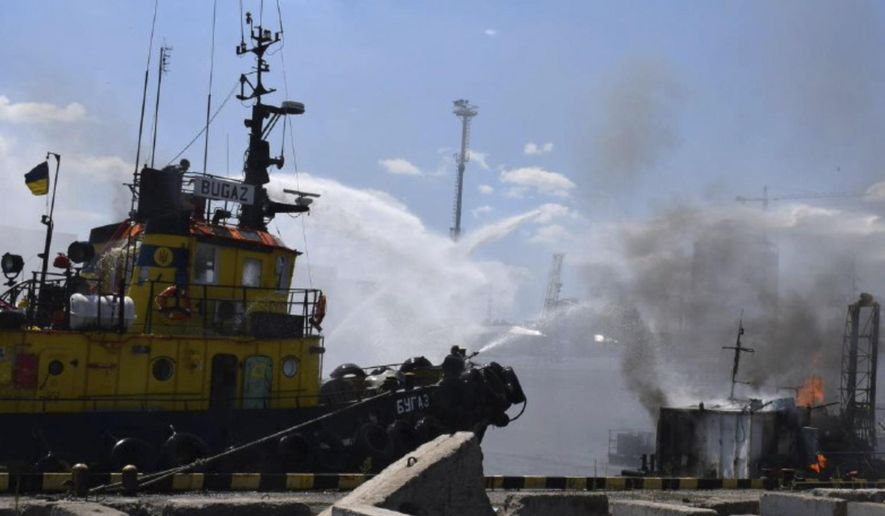A deal to begin shipping Ukrainian grain to markets around the world will proceed despite Russia’s surprise attack on the Black Sea port city of Odesa, Ukrainian officials said Sunday.
International condemnation continued to pour in for the Russian cruise missile strike Saturday, which came just after a deal brokered by Turkey to ease the blockade of Ukrainian ports and allow the grain to be shipped.
Russia and Ukraine are two of the world’s biggest exporters of wheat and other agricultural products, especially to developing countries in the Middle East, sub-Saharan Africa and Asia. Russia’s invasion of Ukraine — which reached the five-month mark on Sunday — has sharply reduced supplies and sent prices soaring on world markets.
Despite the Saturday attack, “we continue technical preparations for the launch of exports of agricultural products from our ports,” Ukrainian Infrastructure Minister Oleksandr Kubrakov said on Facebook early Sunday.
Turkey’s Defense Ministry also announced Sunday that a coordination center was being set up in Istanbul to monitor the shipments, on the expectation that blockading Russian ships will honor last week’s agreement and let the Ukrainian grain through.
Odesa and other Black Sea ports still in Ukrainian hands are the key shipping point for the country’s vast grain harvests. The deal announced by Moscow, Kyiv and Ankara on Friday called for blockading Russian ships to allow 20 million metric tons of Ukrainian grain to be shipped abroad.
SEE ALSO: Russia tests U.S. air defenses in midst of Ukraine war
Russia’s Foreign Ministry defended the cruise missile attack on Odesa, which Russian forces tried and failed to capture early in the invasion, even as Ukrainian President Volodymyr Zelenskyy and Western leaders sharply condemned the strike.
The grain deal, negotiated in part through the United Nations, was one of the first significant negotiated agreements between Kyiv and Moscow since the fighting began Feb. 24.
It reportedly contained a provision that Russia would refrain from attacks on Odesa and three other Black Sea ports as the grain was being prepared for shipping through agreed-upon “safe corridors.”
There were conflicting reports over whether the Russian cruise missiles hit grain stocks on the docks at Odesa. Ukrainian officials said a total of four cruise missiles were fired Saturday, with two being blocked by Ukrainian missile defense systems.
Secretary of State Antony Blinken said in a statement that Saturday’s attack “undermines the effort to bring food to the hungry and the credibility of Russia’s commitments to the deal finalized [Friday] to allow Ukrainian exports.”
U.N. Secretary-General Antonio Guterres also “unequivocally condemned” the Odesa attacks in a statement Saturday.
SEE ALSO: Iranian exile dissident group calls off summit after terror threat
“Yesterday, all parties made clear commitments on the global stage to ensure the safe movement of Ukrainian grain and related products to global markets,” the U.N. leader said. “These products are desperately needed to address the global food crisis and ease the suffering of millions of people.”
But a Russian Defense Ministry spokesman insisted that the cruise missile strike Saturday targeted only weaponry in a Ukrainian military shipyard.
“Sea-based high-precision long-range missiles destroyed a docked Ukrainian warship and a warehouse with Harpoon anti-ship missiles supplied by the U.S. to the Kyiv regime,” ministry spokesman Igor Konashenkov said at a daily briefing, according to The Associated Press.
Away from the Black Sea coast, Ukrainian officials reported continued shelling Sunday by Russian forces along the broad front between the two sides in southern and eastern Ukraine, although there was little change in the area controlled by either side.
Separately, Russian Foreign Minister Sergey Lavrov traveled to Egypt for talks Sunday, the first leg of an Africa trip which will reportedly include Ethiopia, Congo and Uganda. The Kremlin has reached out to non-Western governments since the fighting began to sidestep punishing economic sanctions and to advertise the fact that Moscow is not totally isolated in the crisis.
Egypt is one of the prime countries facing shortages and higher food prices because of the war, buying 80% of its grain from Ukraine and Russia. Mr. Lavrov said in Cairo that Russian grain exporters would “fulfill all their obligations” under the new deal to free up international shipments.
• This article was based in part on wire service reports.
• David R. Sands can be reached at dsands@washingtontimes.com.




Please read our comment policy before commenting.